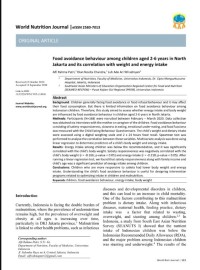Food avoidance behaviour among children aged 2-6 years in NorthJakarta and its correlation with weight and energy intake

Author
Alfi Rahma Putri - Personal NameDian Novita Chandra - Personal Name
Luh Ade Ari Wiradnyani - Personal Name
Abstract:
Background: Children generally facing food avoidance or food refusal behaviour and itmay affect their food consumption. But there is limited information onfood avoidance behaviour among Indonesian children. Therefore, this study aimed to assess whether energy intake and body weight are influenced by food avoidance behaviour in children aged 2-6 years in NorthJakarta.Methods:Participants (N=168) were recruited between February –March 2020. Data collection was obtained via interviews with the mother or caregiver of the children. Food avoidance behaviour consisting of satiety responsiveness, slowness in eating, emotional under-eating,and food fussiness was measured with the Child Eating Behaviour Questionnaire. The child’s weight and dietary intake wereassessed usingadigital weighing scale and 2 x 24 hours foodrecall. Spearman test was performed to analyse thecorrelation between these variables. Multivariate analysis was done using linear regression to determine predictorsof achild’s body weight and energy intake.Results: Energy intake among children was below the recommendation, and it was significantly correlated with thechild’s body weight. Satiety responsiveness was negatively correlated with thechild’s body weight (r = -0.166; p-value < 0.05) and energy intake (r = -0.210; p-value < 0.05). After runningalinear regression test, we found that satiety responsiveness along with family income and child’s age was asignificant predictor of energy intake among children. Conclusions:Children who are more responsive to satiety had lower body weight and energy intake. Understanding thechild’s food avoidance behaviour is useful for designing intervention programs related to optimizing intake in childrenand malnutrition
Detail Information
| Series Title | : | - |
| Call Number | : | - |
| Publisher | : | : World Nutrition Journal., 2021 |
| Collation | : | World Nutrition Journal, 2021 ( 122-130) |
| Language | : | English |
| ISBN/ISSN | : | 2580-7013 |
| Classification | : | NONE |
 Computer Science, Information & General Works
Computer Science, Information & General Works  Philosophy & Psychology
Philosophy & Psychology  Religion
Religion  Social Sciences
Social Sciences  Language
Language  Pure Science
Pure Science  Applied Sciences
Applied Sciences  Art & Recreation
Art & Recreation  Literature
Literature  History & Geography
History & Geography